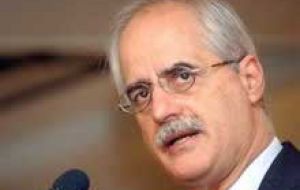MercoPress. South Atlantic News Agency
The Ibero-American summit remains divided over the Honduran crisis
 Argentine minister Jorge Taiana said the Honduran elections could become a new way of validating “coups”
Argentine minister Jorge Taiana said the Honduran elections could become a new way of validating “coups” The Ibero-American summit of 22 countries began Sunday in the seaside resort of Estoril, Portugal, amid divisions over the elections being held in Honduras. Foreign ministers were unable to reach a common position on the situation where ousted president Manuel Zelaya has called for a boycott of the elections staged by the de facto government.
“What is at stake is whether we validate or not a new methodology of coups d'etat,” said Argentine Foreign Minister Jorge Taiana, whose country was seeking a rejection of the elections along with Bolivia, Cuba, Brazil, Spain, Venezuela, Ecuador, Paraguay, Guatemala and Chile.
“We do not recognize those who carried out the coup” that ousted Zelaya on June 28, Bolivian Foreign Minister David Choquehuanca told the German Press Agency DPA.
Some countries, however, felt the elections should be recognized as a way out of the political deadlock in Honduras.
“The elections represent a step ahead” said Panamanian Foreign Minister Juan Carlos Varela”(The coup) was six months ago, and we need to look to the future of 6 million Hondurans.“
Peru and Costa Rica were also believed to agree with the United States, which has said it will recognize the elections. Heads of state were due to discuss the matter on Monday.
The 14 heads of state in attendance included Colombian President Alvaro Uribe, one of the first to arrive, whose country is feuding with Venezuela over US use of military bases in Colombia.
The absence of Venezuelan President Hugo Chavez was expected to reduce bickering between Colombia and Venezuela at the summit but also to lessen chances of mediating the neighbour's diplomatic row.
Chavez has called on Venezuelans to prepare for a war against what he calls a US-Colombian plot to promote ”Yankee imperialism,“ after Bogotá authorized Washington to use seven military bases.
Chavez blamed his failure to attend the summit on having ”a lot of work, a lot of trips“ on his agenda. Other leaders close to Chavez who did not attend include Daniel Ortega of Nicaragua, Evo Morales of Bolivia and Raul Castro of Cuba.
Honduran de facto leader Roberto Micheletti did not attend, either. With polls open Sunday for the country's regularly scheduled elections Micheletti had stepped aside for a week coinciding with the vote to remove the leadership crisis as a distraction.
Ibero-American countries include Latin American countries, Spain, Portugal and Andorra.
The official motto of the summit was ”Innovation and Knowledge,“ as it prepared to discuss ways to promote new technologies in Latin America.
Policies in that field would determine ”the success or failure of economies” in the medium and long term, Portuguese Prime Minister Jose Socrates said at an Ibero-American entrepreneurial meeting in Lisbon.




Top Comments
Disclaimer & comment rulesCommenting for this story is now closed.
If you have a Facebook account, become a fan and comment on our Facebook Page!